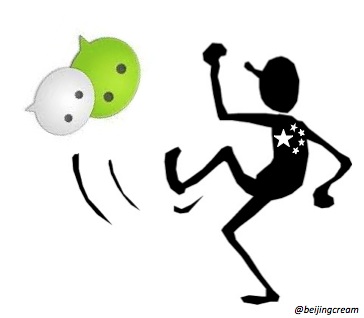
In China, if you can’t beat them, call upon your buddies in a high-ranking ministry to bring them down to your level.
China Telecom, China Unicom, and China Mobile, three state-owned telecom enterprises, apparently feel so threatened by Tencent’s free Weixin (WeChat) program — specifically its ability to allow users to text and send voice messages (again, for free) — that they’ve called upon the government to even the playing field.
On March 28, an official in the National Development and Reform Commission called for Tencent to charge WeChat users. According to SCMP:
Shi Wei, a director at the commission’s Institute of Economic System and Management, made the following controversial comments during an interview with Xinhua:
“If Wechat doesn’t charge a fee, then why do text messages charge a fee? This is basic economics. If text messages charge a fee, then so should Wechat.”
And as Tea Leaf Nation reports, CCTV posted a Sina Weibo message yesterday that suggests the Ministry of Industry and Information Technology may be actively trying to alter Tencent’s business model:
Head of the Ministry of Industry and Information Technology (MIIT) Miao Wei has stated that the MIIT is currently considering whether to require [Tencent], the operator of Weixin, to implement a fee on [the service]. They have already asked operator [Tencent] to submit a [plan] to the Ministry. [Mr. Wei] also stated that fees in addition to data fees paid to telecom operators are entirely reasonable, but the supervising bureaus can [view the matter] from the users’ perspective, [so although] fees on Weixin are possible, they will not be onerous.
To be clear, neither the NDRC nor the MIIT care about helping Tencent make money. They simply want to erect a paywall that, even if not “onerous,” will assuredly cause WeChat to hemorrhage users. It’s the Great Firewall logic: one merely needs to make it inconvenient for users to freely access something and many of them will stop trying. Newspaper publishers can also tell you about viewership dips once online paywalls go up.
Tea Leaf Nation continues:
Weixin’s rapid growth may have cannibalized SMS [text message] fees for China’s mobile providers; in 2012, Caijing magazine reported that “the number of SMS messages sent by China Mobile users witnessed record low growth in 2012.” With its powerful voice communication features, Weixin may also have taken a bite out of the operators’ voice fees.
If Tencent doesn’t want to charge a fee, could the government make them? “Rule by law,” right? More likely, a few well-placed bribes in red envelops will make Tencent officials budge. State-owned enterprises win. Tencent wins. Ministry officials win. 300 million WeChat users lose.
Oh well. Nothing to be done.
With China’s Hottest Social Network in Danger, Netizens Cry: Hands Off! (Tea Leaf Nation)

















































Good article. Would be retarded to fuck up WeChat just when it’s threatening to be the first world-class international IT product from China. But what a great example of the overbearing influence of the SOEs.
WeChat is litterally the only inovative thing to come out of China in years and they are going to fuck it up.
Arf, utter Knuts.
However i’m not sure i’m clear on the proposed payment mechanism. Do they want to charge for the app itself or use microtransactions to fund messages? I’m guessing the former as it would allow a dual distribution system (any fees would kill the app overseas) but if so how would you enforce it?
it’ funny people didn’t realized this is april’s prank